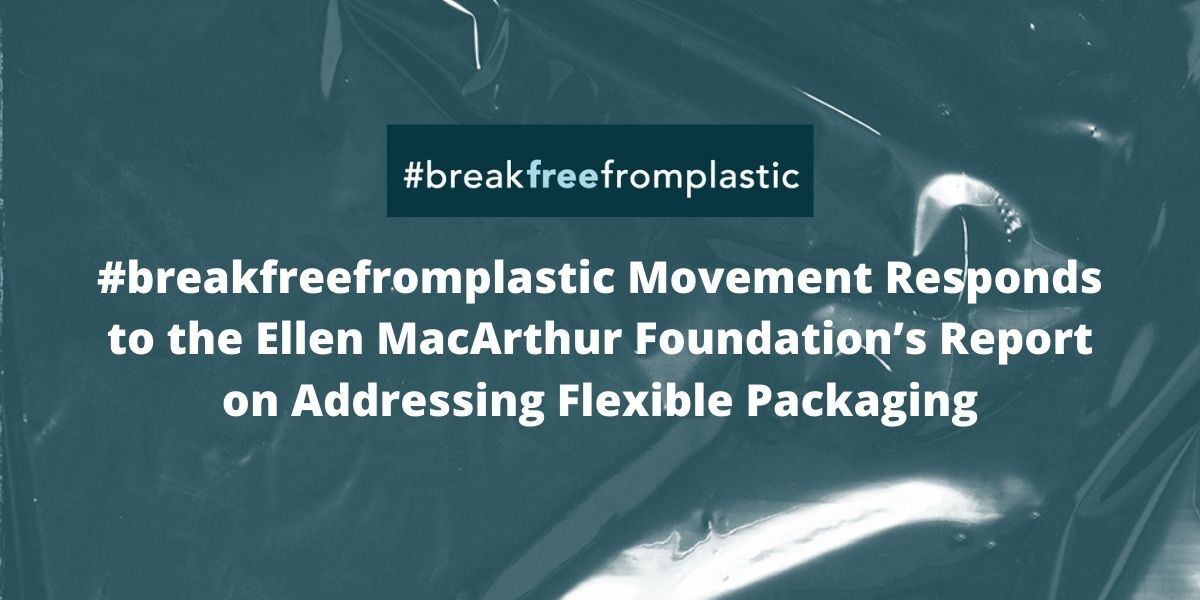Manila - Today, the Ellen MacArthur Foundation (EMF) released a new report entitled “Flexible packaging: The urgent actions needed to deliver circular economy solutions”, which focuses on flexible packaging as the fastest-growing plastic packaging category. This form of packaging is almost uniformly single-use, with high rates of leakage into the environment and very low recycling rates.
Sachets—small sealed packages used to distribute goods in small quantities, which are often made of multilayered single-use plastics–are a particularly critical environmental problem. In fact, the 2020 #breakfreefromplastic Brand Audit identified sachets as the most prevalent plastic waste item found in clean-ups and waste audits globally.
According to EMF, fast-moving consumer goods companies are responsible for distributing more than 146 billion plastic sachets per year in Southeast Asia alone to deliver personal care and home care products. Although sachet pollution is particularly bad in Asia due to corporations’ packaging standards in the region, they are also discarded in the form of to-go condiment packages throughout the global north and in other forms around the world.
Many corporations that sell sachets have joined the Ellen MacArthur Foundation New Plastic Economy Global Commitment to have 100% of their packaging recyclable, reusable, or compostable by 2025. However, Nestlé, Unilever, and other corporations that have regularly figured as top polluters in #breakfreefromplastic’s Brand Audits, continue to rely on this highly-polluting mode of product delivery. Due to the use of multiple materials and toxic additives, plastic sachets and pouches are inherently difficult and expensive to safely manage and recycle—costs which local governments and taxpayers often end up paying for. In some cases, corporations using the guise of plastic offsetting, tap waste pickers to collect and transport sachets to cement kilns where they are ultimately incinerated—a practice the EMF report describes as “not desirable” in a circular economy.
Among the 21 specific and urgent actions proposed in the report, the EMF recognizes the need for the direct elimination of unnecessary flexible packaging, and the need to innovate reuse and refill systems to replace the need for sachets, while exposing the inherent limitations of "chemical recycling" that the industry uses to justify the continued production of single-use plastic.
Member organizations in the #breakfreefromplastic movement have been working to address the pollution caused by flexible packaging and demand real solutions and accountability:
Christie Keith, International Coordinator of Global Alliance for Incinerator Alternatives (GAIA) , said:
"It is clear from this report that so-called 'chemical recycling' is more trouble than it's worth– namely the 50-70% material loss, high costs, and the fact that most operations surveyed are either commercially defunct or actually just burning plastic, a major climate threat. Big brands and investors should take note: investing in chemical 'recycling' is throwing money away that could be spent on real solutions like reuse systems. Chemical 'recycling' must be revealed for what it really is, an industry fig leaf for more single-use plastic production."
Lakshmi Narayanan, Co-founder of SWaCH Cooperative Pune, a waste picker cooperative said:
“Addressing challenges to handling unnecessary flexible packaging will benefit the informal waste sector, as these materials have lower value compared to other packaging materials. While improved collection and recycling infrastructure are critical, governments and corporations should put emphasis on the role of the informal sector, instead of relying on centralized or token investments, to ensure that they're properly incentivized and not merely internalizing the cost of handling low-value flexible materials.”
Marian Ledesma, Zero Waste Campaigner from Greenpeace Southeast Asia - Philippines, said:
“This latest report underscores how big brands have unleashed a scourge of plastic pollution on communities and their environment, particularly in the form of sachets which are impacting the lives of the most vulnerable. We need big brands like Coca-Cola, PepsiCo, Nestlé, and Unilever to end their addiction to plastic packaging and match the gravity of this crisis with concrete solutions. We call on Coca-Cola, PepsiCo, Nestlé, and Unilever to focus their efforts on reduction and to switch their business models to refill and reuse systems instead of investing in false solutions like chemical recycling, co-processing or bogus recycling schemes which will not solve this crisis.”
Miko Aliño, Project Coordinator for Corporate Accountability from #breakfreefromplastic, said:
“We welcome the Ellen MacArthur Foundation’s call for the elimination of multilayered flexible packaging and agree with its urgency. Every day, we witness how sachets are destroying natural resources and affecting the livelihood of communities across Asia. These communities are tired of hearing empty promises from corporations while seeing no real progress. So it is imperative that these companies take meaningful and urgent action to quit sachets.”
Press Contacts:
· Asia & the Pacific: Jed Alegado, Jed@breakfreefromplastic.org
Eah Antonio, Eah@breakfreefromplastic.org
· Europe: Bethany Spendlove Keeley Bethany@breakfreefromplastic.org
· United States: Brett Nadrich, Brett@breakfreefromplastic.org
· Global Press Contact: Caro Gonzalez, Caro@breakfreefromplastic.org




